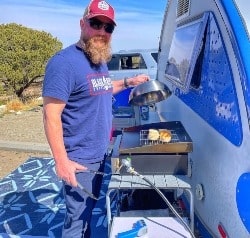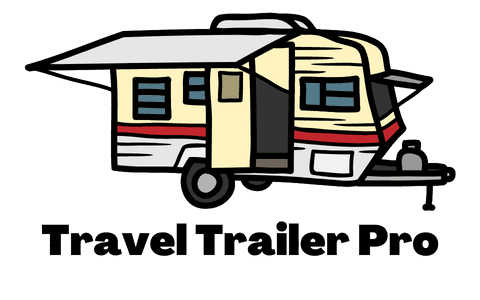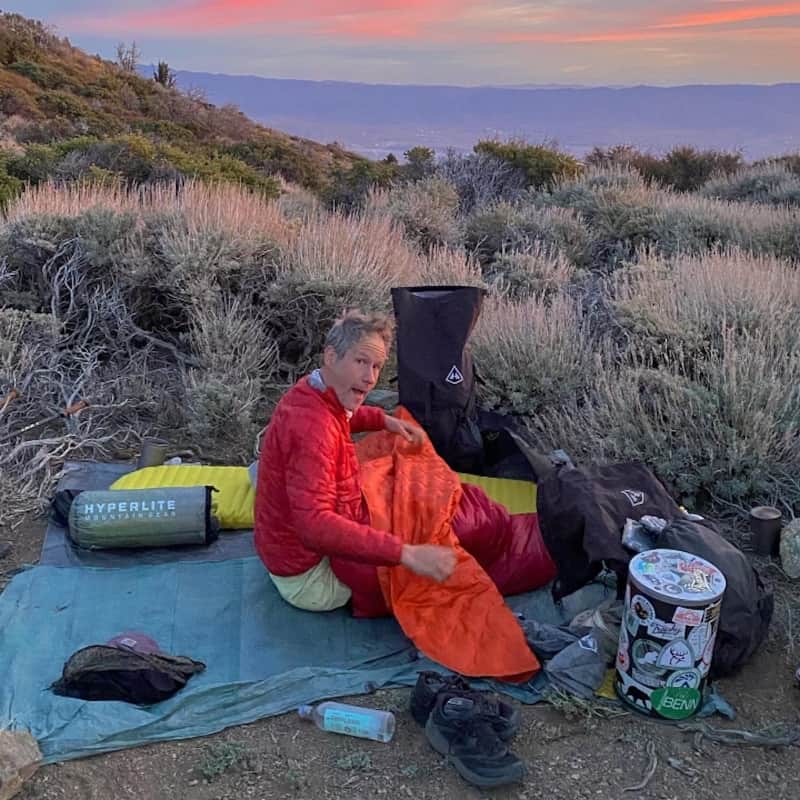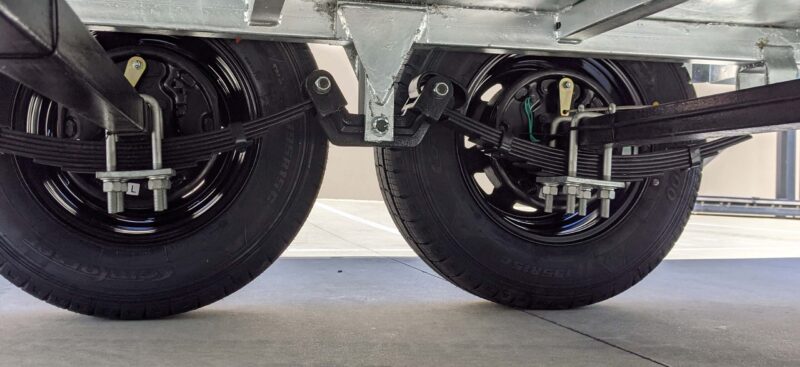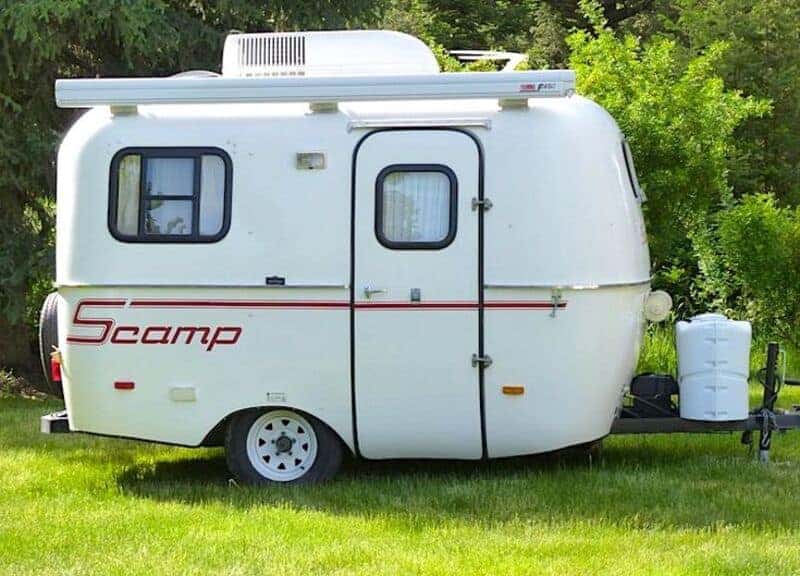In the cowboy camping vs. RVing discussion, some choose the ultra-minimalistic camping lifestyle of heading out into nature with a backpack, sleeping bag, and their wits. It’s not for everybody, and RVing offers many experiences that sleeping under the stars doesn’t.
Cowboy camping has become popular once again. Young people are filling their Instagram accounts with photos of campsites without tents. They either lay their sleeping bags on the ground or sleep among the trees filled with hammocks.
The simplicity of cowboy camping seems very opposite to RVing. However, when comparing cowboy camping vs. RVing, you’ll find some interesting similarities.
At some point in everyone’s life, sleeping on the ground becomes more of a burden than a fun adventure. Many people looking to sleep off the ground start wondering about the pros and cons of cowboy camping vs. RVing.
If you’ve reached this point in your life, follow along with us as we explore the question; cowboy camping vs. RVing: which is better?
What Is Cowboy Camping?
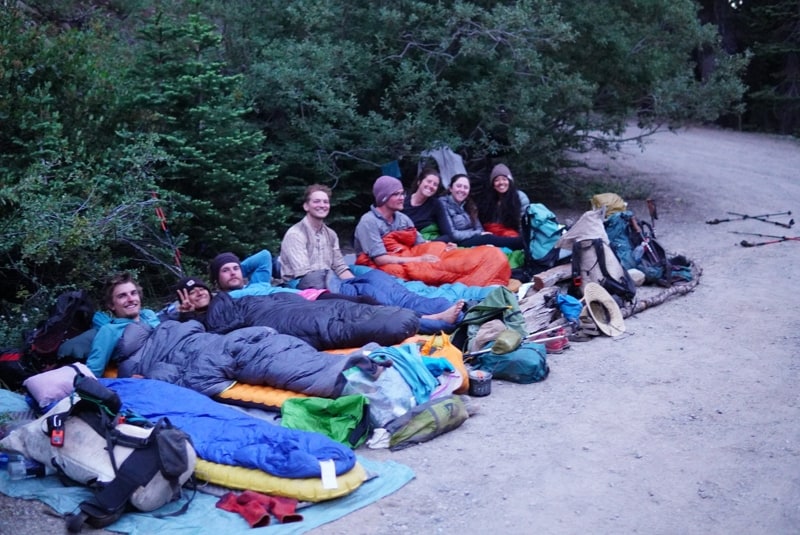
We alluded to the definition of cowboy camping in our introduction. Cowboy camping is sleeping outdoors without a shelter. Its name comes from the way cowboys traveling with herds from pasture to pasture would sleep on the ground under the stars.
Cowboy camping is as simple as it gets. It requires minimal equipment and allows you to experience nature at night.
3 Reasons Why Is Cowboy Camping Popular Again?
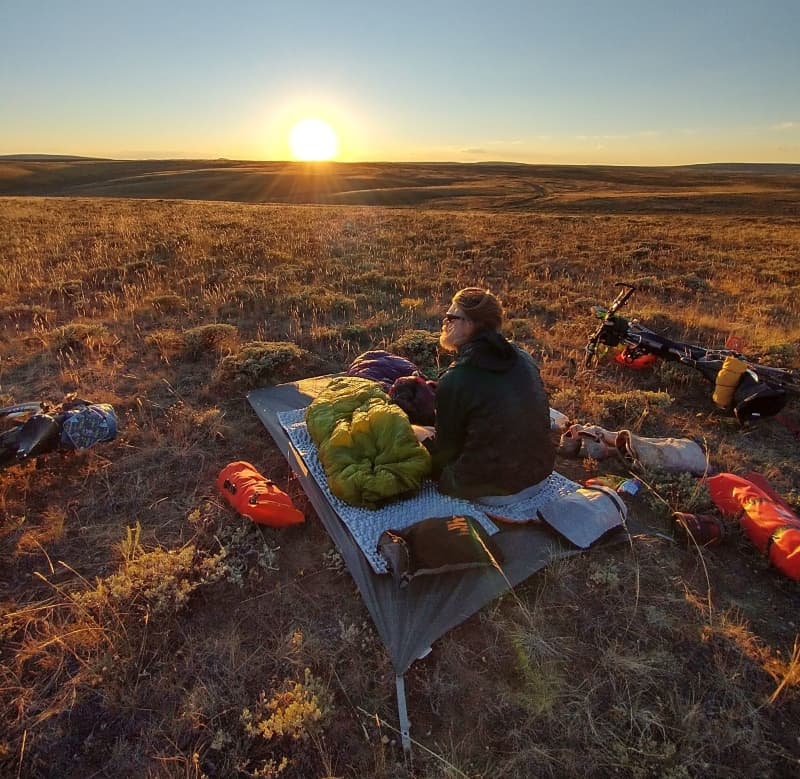
There isn’t one reason to point out that has made cowboy camping popular again. It may be one of many things. Some of the more popular reasons include:
1. Don’t Have To Carry A Tent
If you’re hiking or backpacking, cowboy camping means you don’t have to carry a tent. This type of camping requires minimal gear, which saves weight and space if you’re backpacking or hiking.
2. You get Closer to Nature When You Cowboy Camp
Without the cover of a tent, you can enjoy the sunrise, the stars, and the moonlit views you’ll miss inside a tent.
3. Commune Better With Nature
Our lives are so full of demands and distractions. When you cowboy camp, you completely get away from the things of civilization and enjoy the simplicity of nature, even if it’s for a day or two.
What’s the Difference Between Cowboy Camping and RVing?
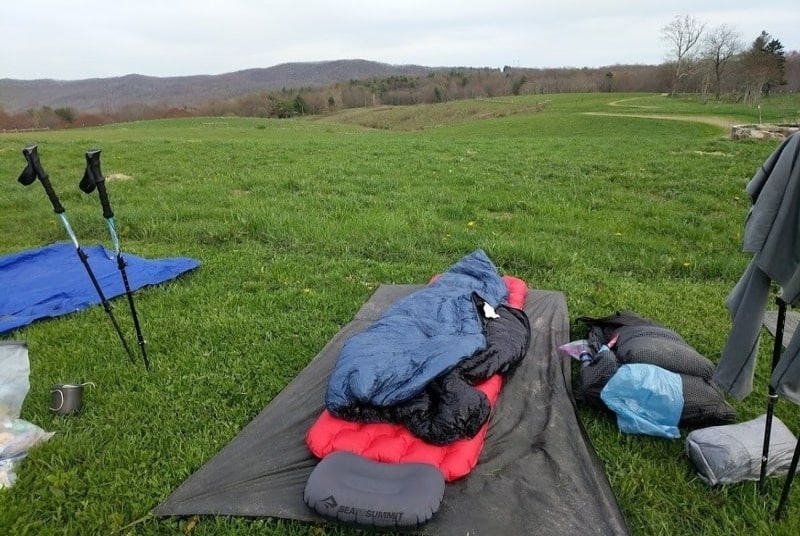
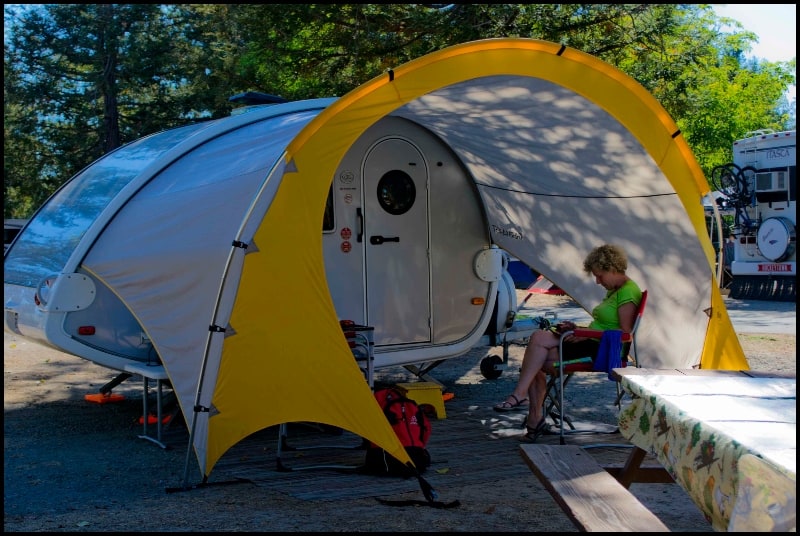
The biggest difference between cowboy camping and RVing is the availability of shelter and the comforts of home. Cowboy camping is the picture of simplicity, while RVing (even in a small teardrop camper) has many of the conveniences of home.
The other big difference between cowboy camping and RVing is the places you can access. Sure, overlanding and boondocking in a travel trailer can get you away from the crowds, but not like backpacking and cowboy camping. If you really want to get away, traveling by foot, with minimal gear is the way to go.
6 Cowboy Camping Pros
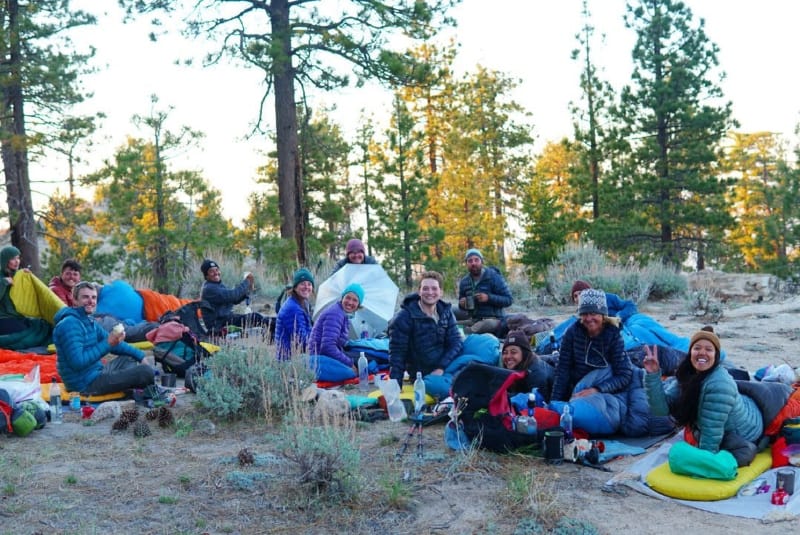
1. It’s Free
Outside of the cost of the minimal necessary equipment, cowboy camping is free. If you can find a place on public lands to set up your sleeping pad, sleeping bag, or hammock, you are ready to camp.
The one exception to this rule is when backpacking and camping in National Parks. Even if you’re planning to cowboy camp, you’ll be required to use designated backcountry camping sites and pay for a backcountry permit.
2. You Need Very Little Equipment
Most people who go cowboy camping have minimal equipment. Start with a backpack to carry your gear. You’ll want a sleeping pad, a bag, or a hammock. Use a small camp stove with a multipurpose cooking container for meal prep. You’ll also want a tarp to make shelter just in case it rains.
Small camp stoves with a multipurpose cooking container for meal prep will minimize your backpack storage space. You’ll also want a tarp to make shelter just in case it rains.
3. Super Easy Campsite Setup
Depending on your preferred sleeping method, your cowboy camping could be super easy or just easy. For sleeping on the ground, you’ll roll out your sleeping pad and place your sleeping bag on top. This is super easy.
If you’re going for the hammock, you’ll need to find two acceptable trees and then hang your hammock. Finding good trees could be a challenge so setting up a hammock is only easy, not super easy.
4. No Electronic Distractions
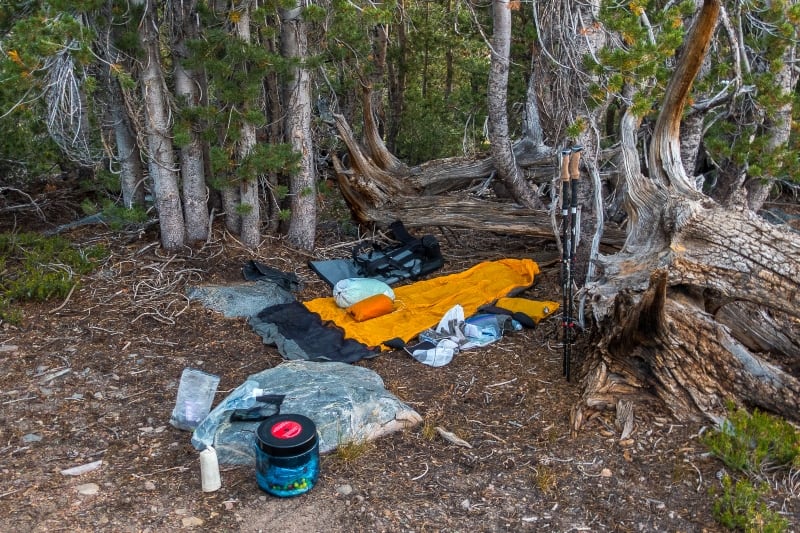
Cowboy camping forces you to disconnect from the electronic distractions of everyday life. There’s no phone, no computer, and no TV. You have nature to entertain you. Or bring a book if you need more than the sounds of birds, crickets, and frogs.
Most cowboy campers carry a cell phone just in an emergency.
5. Better Communion with Nature
Cowboy camping takes you away from the crowds into places that are often undisturbed. In these undisturbed places, you enjoy views that are worth a day’s hike. Animals pause but don’t run when they see you. Trees, grasses, wildflowers, and plants surround your path.
Getting this close to nature gives you a different perspective of our planet. You learn to appreciate the balance of life and enjoy the gift that is our natural Earth.
Getting this close to nature gives you a different perspective of our planet. You learn to appreciate the balance of life and enjoy the gift that is our natural Earth.
6. A Boost of Self Confidence
Though simple, cowboy camping isn’t easy. It can be scary the first time you camp unprotected from the elements and animals. Getting to your amazing campsite probably wasn’t easy and required a bit of physical effort. Successfully completing the first cowboy camping experience can be a huge confidence builder. The sense of accomplishment you gain may help you take on other challenges in life that you might have put off.
Successfully completing the first cowboy camping experience can be a huge confidence builder. The sense of accomplishment you gain may help you take on other challenges in life that you might have put off.
6 Cowboy Camping Cons
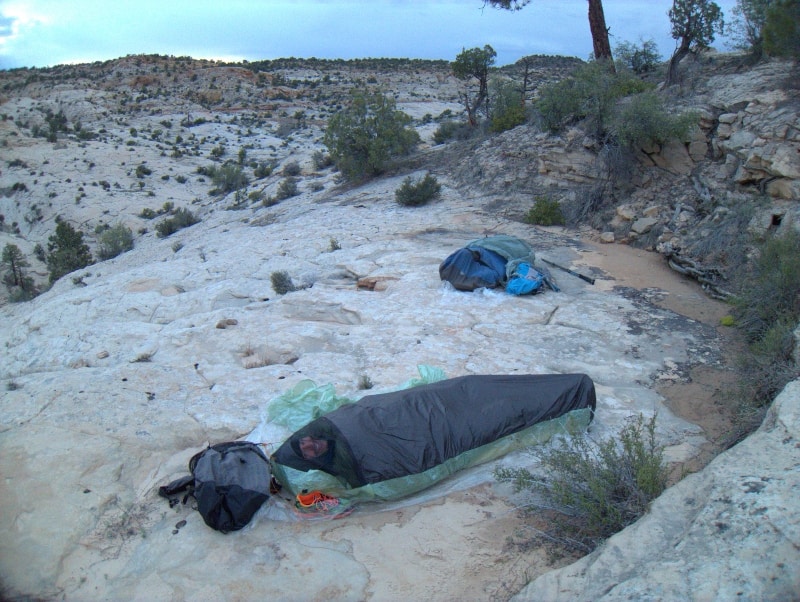
1. Bad Weather
When you cowboy camp, the weather can be your friend and enemy. When the weather is nice, cowboy camping is amazing. But rain, wind, or unexpected snow can make cowboy camping miserable.
Many cowboy campers carry a tarp or even a small tent, just in case the weather gets bad, and you need to make a shelter.
2. It Can Be Dangerous
There are a lot of things that can make cowboy camping dangerous. Many, however, can be minimized or eliminated with a bit of preparation. One of the most significant dangers to cowboy camping, especially at high altitudes, is hypothermia. But you can prepare for this with a shelter option and a warm coat.
Animals can also be potentially dangerous. Knowing how to safely camp around wildlife (particularly bears) can reduce your potential for dangerous interaction.
3. Challenging Meal Preparation
You’ll be carrying your gear on your back, so you’re not going to bring a full camp stove, pots and pans, and ingredients for a gourmet meal. Most cowboy campers enjoy simple foods that can be mixed with hot water or eaten cold.
Your cooking equipment will be a backpacking stove with an attached aluminum cooking container. You’ll eat with backpacking utensils. Mediocre meals are the trade-off to having an amazing experience in nature.
4. Lots of Bugs
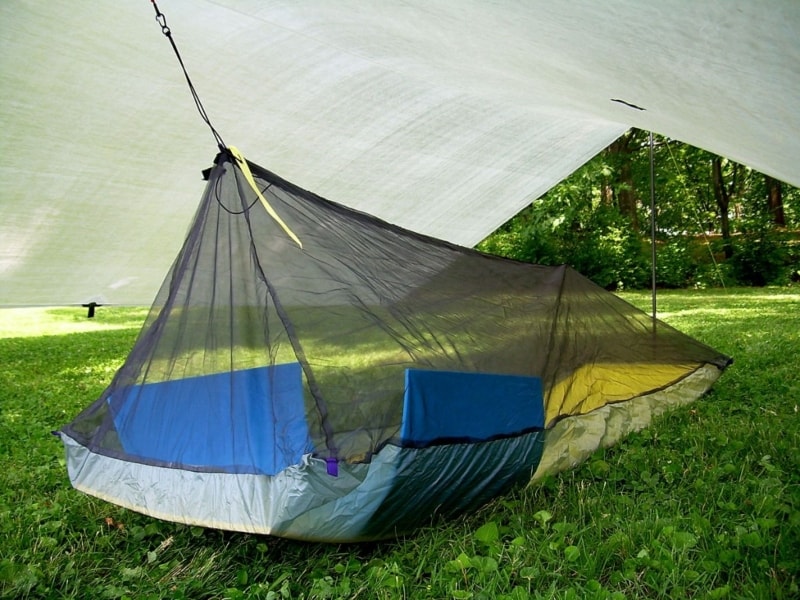
Bugs are the worst part of cowboy camping. Without shelter, you’re fair game for mosquitos, biting flies, spiders, crickets, and other creepy creatures. Even a tent provides a bit of protection from insects.
5. Generally Uncomfortable
Cowboy camping is no big deal for the young and the young at heart. But, at some point in life, sleeping on the ground becomes uncomfortable. It’s nearly impossible in most cases to find a perfectly level, rock-free spot to set your sleeping bag. Even with a sleeping pad, you’re still subject to uneven ground.
Hammocks are equally difficult. They provide no support for your back; if they aren’t hung correctly, you can sleep in a very strange position.
6. Not Suitable for Everyone
Cowboy camping is only for people who can hike to a remote location and find peace and comfort sleeping on the ground. This really limits the number of people that can experience cowboy camping.
You’ll not find many families with small children on the trail or camping under the stars. With a few exceptions, senior citizens or the elderly aren’t going to be cowboy camping. And remote locations aren’t accessible to individuals in wheelchairs or with physical disabilities.
6 RVing Pros
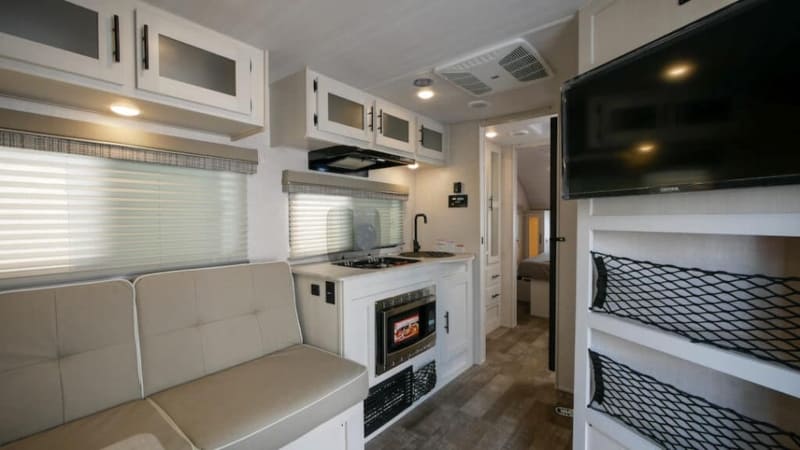
1. Comforts of Home on Wheels
RVing allows you to get away from home but not have to leave some of the best home comforts behind. Most RVs have soft beds, decent kitchens, and bathrooms. Larger RVs often have complete entertainment systems, including TVs, Wi-Fi, and internet access.
2. Safer and More Secure
RVs, even travel trailers, provide you with a more solid and stable shelter when you’re camping. Solid walls, locking doors, and screened windows add to the safety and security of an RV.
With an RV, you can bring some of the comforts of home that you would leave behind while cowboy camping. Computers, smartphones, sporting equipment, and many other pricy items can be locked securely in your camper.
Additionally, four solid or mostly solid walls keep nature outside, protecting you from wildlife, changing weather conditions, and even humans with nefarious intentions.
3. Very Little Set Up
As with cowboy camping, RVing requires minimal effort for set-up. RVs are parked in your campsite, leveled, and can be ready for fun in just a few minutes. Setup may take a bit longer if you’re camping in an RV park or campground with RV hookups.
Either way, camping in a motorhome or travel trailer is much faster than pitching a tent and setting up a rustic camp kitchen.
4. The Ability to Be Self-Contained
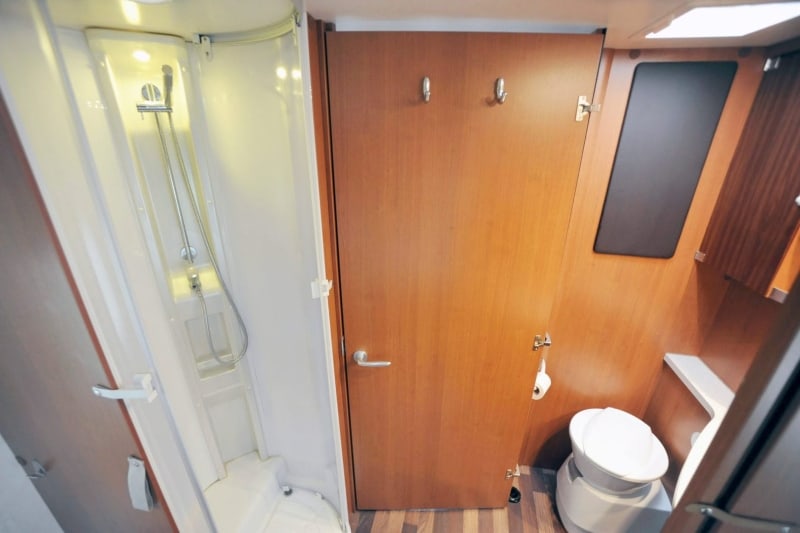
Being self-contained is one of the most popular reasons people buy an RV. RV camping is comfortable even if you’re not enjoying the comforts of an RV park or full hook-up campground.
RVs come with battery power, generators, and bathrooms for self-contained operation. Most RVs have holding tanks for freshwater, gray water, and black water, so you can enjoy the convenience of your own bathroom and sinks.
RV kitchens come with stoves, ovens, refrigerators, and even microwaves, so you never have to figure out how to cook on a campfire or eat freeze-dried foods.
5. Temperature Control
RVs allow you to enjoy new places at about any time of the year. Many RVs come with furnaces and heaters, allowing for perfect temperature control all year round.
When you cowboy camp or even use a tent, your comfort is at the mercy of the weather and how much gear you have. In an RV, like at home, you set your temperature, and the furnace and air conditioner do the work.
6. Simple Meal Preparation
As we mentioned with being self-contained, cooking in an RV is a delightful experience. With most of the standard kitchen appliances available in your RV or travel trailer, you can enjoy your favorite meals while traveling.
The availability of features like microwaves and ovens allows you to make fun snacks like microwave popcorn or chocolate chip cookies. Larger RVs often have full-size to almost full-size kitchen appliances allowing you to cook things like your Thanksgiving turkey while camping.
Besides the cooking side of simple meal preparations, there’s the storage side. RVs provide space for storing spices, canned goods, and most have a refrigerator that allows you to store fresh foods without the mess of ice in a cooler.
6 RVing Cons
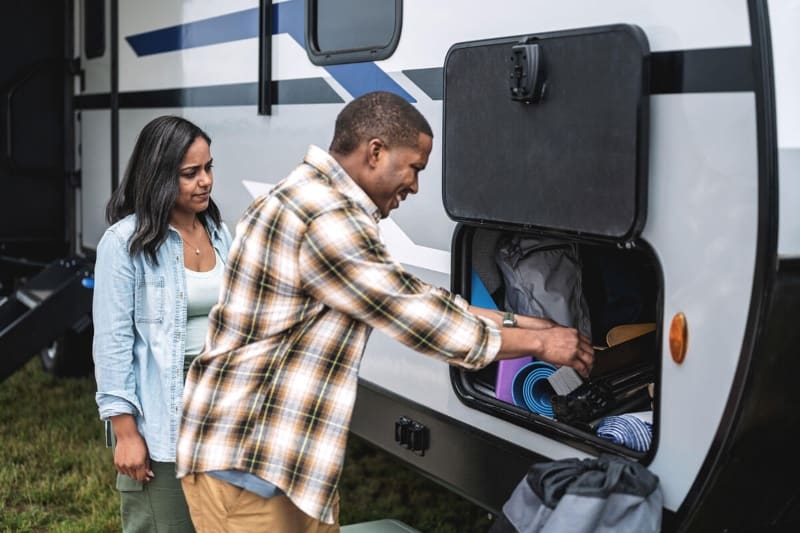
1. Expensive
There’s not much to be said here. Buying an RV is expensive. They’re a substantial financial investment. Once you buy an RV, you also must consider maintenance costs, fuel, storage costs, equipment costs, and the cost of paying to camp in most locations.
2. Lots of Equipment to Bring
You’re not going to be carrying your RV equipment in a backpack. RVs need a lot of gear to get set up. You’ll have chock blocks, jack stands, generators, solar panels, safety equipment like hazard markers, and spare tires.
You’ll need pots and pans for cooking. Toilet paper, paper towels, bathroom supplies, cleaning supplies, and many other items to fully enjoy and utilize the conveniences of your RV.
3. It’s Easy to Stay Inside and Miss Out on Nature
If you’ve ever spent time in an RV park, you’ll notice that many people park their RV and put out their lawn chairs but never leave their RV. Certainly, some people live full-time in their RV, and they have a different RV life than those who RV for fun.
Many of us buy RVs to enjoy nature or see new places. However, features like Wi-Fi access and TV can suck us back into the same routine we left home to avoid.
RVs are big. You’re not going to be driving off-road in your camper. Then there’s the problem of fitting your full-length rig in campsites that aren’t designed to accommodate travel trailers under 30 feet. This really limits where you go and your camping experience.
4. You Can’t Go Anywhere
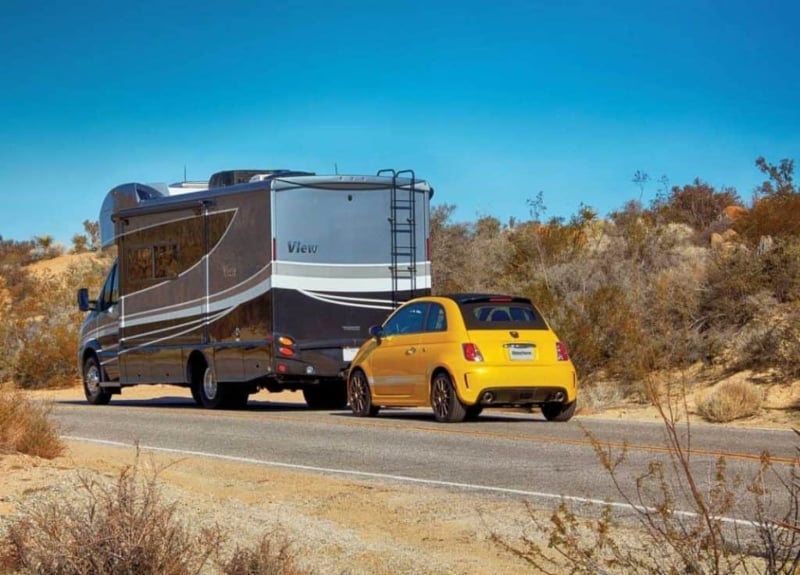
From another perspective, you’re stuck at your campsite if you’re not towing a second vehicle or a travel trailer. Leaving for a cruise around town requires unhooking all your utilities, removing leveling equipment, and packing up your stuff. This is a pain, and it’s easy to see why some RV owners never leave the campsite.
5. You Have to Know How
Most of us aren’t born knowing how to RV, so we learn by doing and educating ourselves. The reality is that it’s hard the first few times you go out in your RV. There are many new skills to learn. Some of the most challenging new skills include driving an RV, connecting to campground hookups, and properly leveling your camper.
6. Taking Care of an RV Is a Lot of Work
Caring for an RV is a lot like maintaining a house. Things break and will need to be fixed. Sometimes you can do the work; other times, you need to hire an expert. If you don’t keep your RV clean, it can decrease the life and comfort of the RV. Campers also need to be properly winterized and stored when not in use.
FAQs About Cowboy Camping vs RV Camping
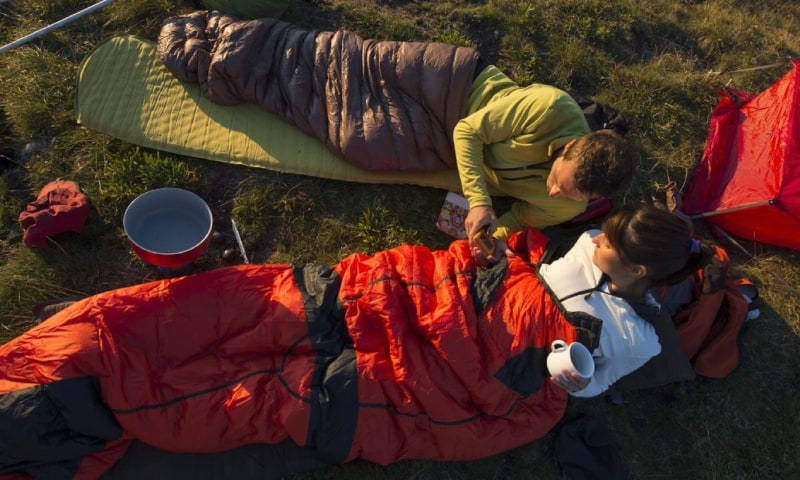
1. How Do You Like to Camp?
When pondering cowboy camping vs. RVing and which is better for you, you need to consider how you enjoy camping or vacationing. An RV may be a good trade-off if you would rather stay in a hotel but want to be closer to nature.
However, if you don’t mind the simplicity of sleeping in a sleeping bag under the stars, cowboy camping may be your favorite way to get out and enjoy nature.
2. Where Do You Want to Camp?
The ‘where’ consideration of cowboy camping vs. RVing is much like the ‘how.’ You really need to think about the ideal location for your camping adventures.
If you like to be far away from other people and don’t mind a drive or a hike to get there, you’ll love and enjoy cowboy camping. If you like experiencing new places but don’t want to work too hard to get there, a fun RV park could be your answer.
3. What’s Your Why?
Besides the ‘how’ and the ‘where,’ you really need to know the ‘why’ that motivates your camping choice. If your ‘why’ is getting closer to nature and escaping from technology, cowboy camping (or tent camping) will fit your ‘why’ best.
If your motivation for camping or vacationing is to get away from home and see new places while also being comfortable, your ‘why’ may lead you to RVing.
So, Is Cowboy Camping vs. RVing Better?
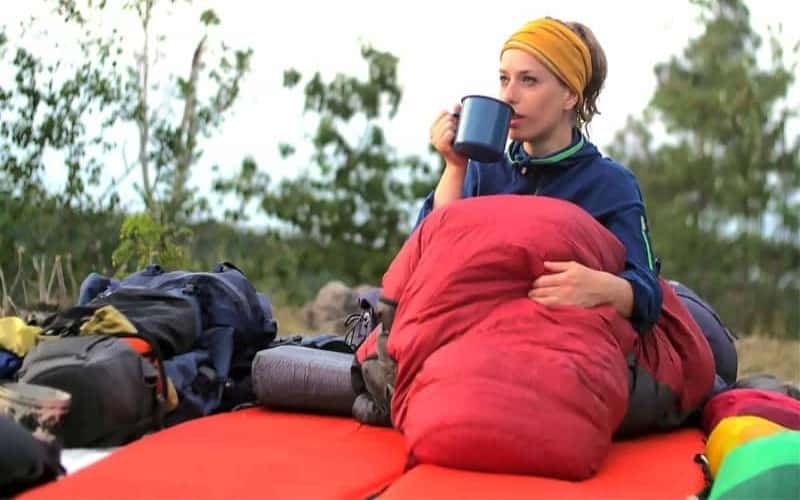
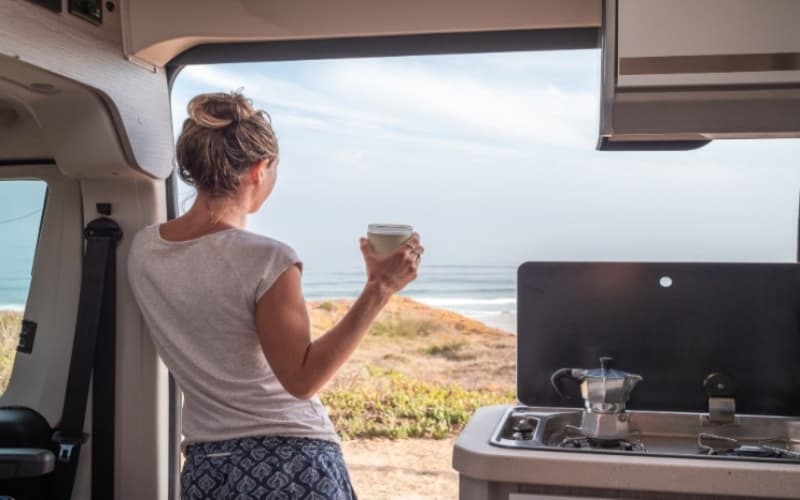
When you get right down to the question of which is better, cowboy camping or RVing, the answer is neither is better. When comparing cowboy camping vs. RVing, the better solution is the one that fits your idea of a great vacation.
If you love to ‘rough it’ and get away from the crowds, cowboy camping may be your perfect escape. However, if you want to enjoy new sites and experiences with more of the comforts of home, RVing is your vacation life.
Hopefully, our pros and cons have helped you understand and evaluate cowboy camping vs. RVing and how it fits your future vacation ideas.
Related Reading:
– 11 Reasons You Should Take an Ebike Camping
About the Author:
Jason Gass is a full-time freelance writer and part-time RVer whose goal is to share great stories around a campfire with good friends.
When he’s not working, he spends most of his time camping, searching for the best breweries, and road-tripping in his teardrop trailer with his wife, daughter, and two dogs.
